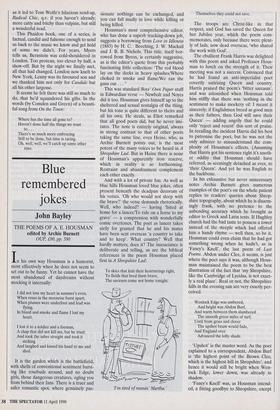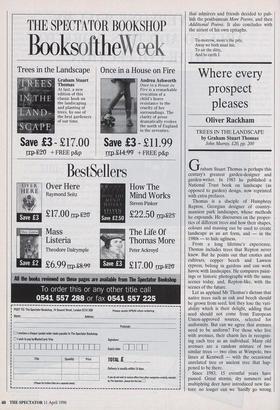Blue remembered jokes
John Bayley
THE POEMS OF A. E. HOUSMAN edited by Archie Burnett OUP, £80, pp. 580 In his own way Housman is a humorist, most effectively when he does not seem to set out to be funny. Yet he cannot have the most abandoned of daydreams without mocking it internally:
I did not lose my heart in summer's even, When roses in the moonrise burst apart; When plumes were underfoot and lead was flying, In blood and smoke and flame I lost my heart.
I lost it to a soldier and a foeman, A chap that did not kill me, but he tried; And took the sabre straight and took it striking And laughed and kissed his hand to me and died.
It is the garden which is the battlefield, with shells of conventional sentiment burst- ing like rosebuds around, and no doubt girls, those dangerous creatures, ogling you from behind their fans. There is a truer and safer romantic spot, where genuinely pas- sionate nothings can be exchanged, and you can fall madly in love while killing or being killed.
Housman's most comprehensive editor, who has done a superb tracking-down job, suggests a borrowing from Love in Idleness (1883) by H. C. Beeching, J. W. Mackail and J. B. B. Nichols. This title, itself bor- rowed from Byron, is certainly suggestive, as is the editor's quote from this probably fascinating little collection: 'The red blood lay on the decks in heavy splashes/Where choked in smoke and flame/We ran the guns out . . . '
This was standard Boys' Own Paper stuff in Edwardian verse — Newbolt and Noyes did it too. Housman gives himself up to the sheltered and sexual nostalgia of the thing, but his tone is quite different to theirs and all his own. He steals, as Eliot remarked that all good poets did, but he never imi- tates. The note is entirely original, always in strong contrast to that of other poets taking the same line, even Heine, who, as Archie Burnett points out, is the most potent of the many voices to be heard in A Shropshire Lad. But in Heine there is none of Housman's apparently iron reserve, which in reality is so forthcoming. Restraint and abandonment complement each other exactly.
And with a lot of private fun. As well as blue hills Housman loved blue jokes, often present beneath the deadpan decorum of his verses. 'Oh who would not sleep with the brave?' the verse demands rhetorically. Well, who indeed? — having 'listed at home for a lancer/To ride on a horse to my grave' — a compression with wonderfully comic overtones. The poet as lancer takes airily for granted that he and his mates have been sent overseas 'a country to take and to keep'. What country? Well that hardly matters, does it? The insouciance is deliberate and telling, as are the biblical references in the poem Housman placed first in A Shropshire Lad:
To skies that knit their heartstrings right, To fields that bred them brave, The saviours come not home tonight:
I'm tired of runnin' Martha.'
Themselves they could not save.
The troops are Christ-like in that respect, and God has saved the Queen for her Jubilee year, which the poem com- memorates, only because there were plent- ly of lads, now dead overseas, 'who shared the work with God'.
The ebullient Frank Harris was delighted with this poem and asked Professor Hous- man to lunch on the strength of it. Their meeting was not a success. Convinced that he had found an anti-imperialist poet covertly satirising Queen and country, Harris praised the poem's 'bitter sarcasm', and was astonished when Housman told him stiffly that there was 'nothing in the sentiment to make mockery of: I meant it sincerely; if Englishmen breed as good men as their fathers, then God will save their Queen' — adding angrily that he could only 'reject and resent' this sort of praise. In recalling the incident Harris did his best to patronise the poet, but he was not the only admirer to misunderstand the com- plexity of Housman's effects. (Assuming that Harris got his sentence right it's anoth- er oddity that Housman should have referred, as seemingly detached as ever, to `their Queen'. And yet he was English to the backbone.
In his exhaustive but never unnecessary notes Archie Burnett gives numerous examples of the poet's on the whole patient replies to readers' queries about Shrop- shire topography, about which he is disarm- ingly frank, with no pretence to the unbending accuracy which he brought as editor to Greek and Latin texts. If Hughley church had the bad taste to possess a tower instead of the steeple which had offered him a handy rhyme — well then, so be it. Housman could even claim that he had got something wrong when he hadn't, as in `Fancy's Knell', the last poem of Last Poems. Abdon under Clee, it seems, is just where the poet says it was, although Hous- man maintained the poem to be the best illustration of the fact that 'my Shropshire, like the Cambridge of Lycidas, is not exact- ly a real place'. Real or not, the Shropshire hills in the evening sun are very exactly per- ceived.
Wenlock Edge was umbered, And bright was Abdon Burf, And warm between them slumbered The smooth green miles of turf; Until from grass and clover The upshot beam would fade, And England over Advanced the lofty shade.
`Upshot' is the master word. As the poet explained to a correspondent, Abdon Burf is 'the highest point of the Brown Clee, which is the highest hill in Shropshire', and hence it would still be bright when Wen- lock Edge, lower down, was already in shadow.
`Fancy's Knell' was, as Housman intend- ed, a fitting goodbye to Shropshire, except that admirers and friends decided to pub- lish the posthumous More Poems, and then Additional Poems. It also concludes with the airiest of his own epitaphs.
To-morrow, more's the pity, Away we both must hie, To air the ditty, And to earth I.



































































 Previous page
Previous page